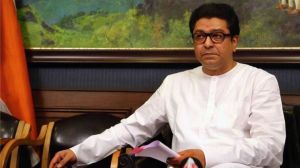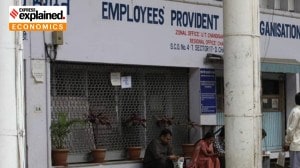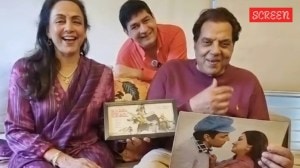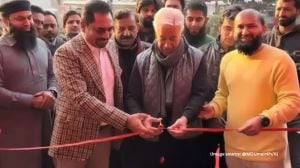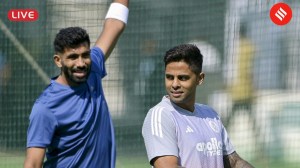Going the Indira way
The cat is out of the bag. The intention of the BJP, which heads the coalition at the Centre, has become clearer. Law Minister Ram Jethmal...

The cat is out of the bag. The intention of the BJP, which heads the coalition at the Centre, has become clearer. Law Minister Ram Jethmalani spilled the beans at a seminar in Calcutta the other day. He said that they would take the recommendations made by the Constitution Review Co-mmittee to the country if Parliament did not accept them. In other words, the recommendations will be the BJP8217;s plank in the mid-term poll which it proposes to enforce.
This confirms the fear that the BJP has its own agenda. The committee is the means, not an end. No doubt, it is difficult to imagine that it will oblige the party. But the Sangh Parivar is capable of building such pressure through petitions and propaganda to create an illusion of popular opinion. When RSS chief Sudarshan says that they would like the Constitution to be re-written, he declares that as the BJP8217;s mentor he is determined to saffronise the document.
A hint of this was contained in an observation Ram Jethmalani made at the seminar. He said he was proud to be a votary of Hindutva. His beliefs are his own concern and none can challenge him on that count. But the disturbing, rather ominous part, was his contention that there was no difference between Hindutva and secularism. Whether he likes it or not, Hindutva has come to be associated with a particular philosophy, that of one nation, one people and one culture.
True, his statement does not bind the committee. Nor are the members probably aware of the BJP8217;s ulterior motives. But every member is an appointee of the BJP-led government. The last two to join a sub-committee are the standard-bearers of equality. They are Justices Krishna Iyer and Chennappa Reddy. Iyer had at one time criticised the constitution of the committee. All the members know that the committee8217;s appointment is without the authority of Parliament which represents the people of India. Still no member has pointed it out. Not only that, the resolution which the Cabinet approved on the constitution of the committee was dated February 22, one day before Parliament met. This fact, too, has been overlooked by the members.
The government8217;s statement that the basic structure of the Constitution will not be changed is a categorical assurance. And there is little doubt that secularism is part of the basic structure. But if Hindutva comes to be defined as secularism or the other way round, then Hindutva will form the basic structure. Already former Supreme Court Chief Justice J.S. Verma, now heading the Nati-onal Human Rights Co-mmission, has created doubts by defining Hindutva as a cultural appellation, not in any way countering the concept of secularism.
The committee needs to clarify the position. The Law Minister8217;s observati-ons at Calcutta have put a question mark against its deliberations. When I asked Ram Jethmalani in the Rajya Sabha ab-out his observations, he said I had 8220;misunderstood him8221;. He must realise that the entire proceedings were recorded. He can say that his remarks were off the cuff. But he cannot deny having made them. I was a participant in the seminar. Wittingly or unwittingly, Ram Jethma-lani has divulged the hidden agenda.
One does not know what else is in store for the nation. The government8217;s resolution is too general. It says that the committee is meant quot;to examine how best the Constitution can respond to the cha-nging needs of an efficient, smooth and effective system of governance and socio-economic development of modern Indiaquot;. Take the phrase of quot;effective system of governancequot; first. How can a constitution make up for the failings of rulers? If they are inept or corrupt, they are going to make a mess of governance. It is evide-nt from the way in which the administration and law and order have deteriorated in the last 50 years.
As for economic development, India would have been a better place to live in if the different governments had only implemented the Fundamental Rights and Directive Principles of State Policy, enunciated in the Constitution. For example, it is a fundamental right of human beings not to be used for forced labour. Again, Article 38 under Directive Principles enjoins upon the State to secure a social order for the promotion of the welfare of the people. How can a committee, which is a creature of the government, find fault with the government, present or past, for not following the Constitution in letter and spirit? The Constitution, no matter how well restructured, cannot eliminate the nexus between bureaucrats, politicians and criminals. This is a mafia which has come to dictate the State. President K.R. Narayanan was quite right when he said: quot;Today when there is so much talk about revising the Constitution, we have to consider whether it is the Constitution that has failed or whether it is we who have failedthe Constitution.quot;
The Constituent Assembly president, Dr Rajendra Prasad, said more or less the same thing nearly 52 years ago, on November 26, 1949, when the Constitution was adopted. His words were: quot;Much would depend on the successful working of democratic institutions.quot; Had the successive rulers exercised restrain, the governance would have reflected the principles of fair play which our forefathers enunciated. The Constitution inspired some awe until the em-ergence of Indira Gandhi.
She was the first to subvert it to sustain her authoritarian rule. She imposed the emergency in June 1975. She extended the term of the Lok Sabha by one year, from five years to six years. She effected changes in the Constitution so as to ensure that she and her cohorts would go scot-free for the excesses they committed during the emergency. In fact, she wanted to restructure the Constitution and appointed a committee for the purpose. She came a cropper because she and her Congress party were defeated at the polls. The emergency, under which the BJP itself suffered, is the darkest period since independence.
Indira Gandhi8217;s compulsion was that she had been unseated by the Allahabad High Court for electoral malpractices. What are the BJP8217;s compulsions? Why is it trying to tread the same path? Is it because of its convoluted thinking? Does it want to divide the nation as it did during the rath yatra by L.K. Advani, now Ho-me Minister? Or is it because there are court cases pending against Advani and his colleague, Murli Manohar Joshi? Whatever the objective, it will hurt the country8217;s homogeneity. Hindutva can destroy the pluralism which sustains un-ity. The Dalits have one more fear. Their pride that Dr B.R. Ambedkar, their le-ader, was the one who gave India its Co- nstitution will be damaged because there is a committee to chip away at it.
The review may not materially change the Constitution much. But it will have the stamp of the committee, lessening Ambedkar8217;s contribution to that extent.
- 01
- 02
- 03
- 04
- 05








